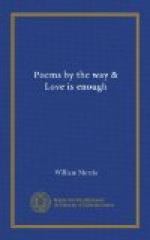He sewed the lily, and he sewed the rose,
And the little fowls of the air;
Then fell the damsels a-marvelling,
For nought had they missed him there.
Day long they sewed till the evening,
And till the long night was deep,
Then up stood dames and maidens
And were fain in their beds to sleep.
So fell on them the evening-tide,
O’er the meads the dew drave down,
And fain was Signy, that sweet thing,
With her folk to bed to be gone.
Therewith asked the King’s son Hafbur,
“And whatten a bed for me?”
“O thou shalt sleep in the bower aloft,
And blue shall thy bolster be.”
She went before, sweet Signy,
O’er the high-bower’s bridge aright,
And after her went Hafbur
Laughing from heart grown light.
Then kindled folk the waxlights,
That were so closely twined,
And after them the ill nurse went
With an ill thought in her mind.
The lights were quenched, the nurse went forth,
They deemed they were alone:
Lord Hafbur drew off his kirtle red,
Then first his sword outshone.
Lord Hafbur mid his longing sore
Down on the bed he sat:
I tell you of my soothfastness,
His byrny clashed thereat.
Then spake the darling Signy,
Out of her heart she said,
“Never saw I so rough a shirt
Upon so fair a maid.”
She laid her hand on Hafbur’s breast
With the red gold all a-blaze:
“Why wax thy breasts in no such wise
As they wax in other mays?”
“The wont it is in my father’s land
For maids to ride to the Thing,
Therefore my breasts are little of growth
Beneath the byrny-ring.”
And there they lay through the night so long,
The King’s son and the may,
In talk full sweet, but little of sleep,
So much on their minds there lay.
“Hearken, sweet maiden Signy,
As here alone we lie,
Who is thy dearest in the world,
And lieth thine heart most nigh?”
“O there is none in all the world
Who lieth so near to my heart
As doth the bold King Hafbur:
Ne’er in him shall I have a part.
“As doth the bold King Hafbur
That mine eyes shall never know:
Nought but the sound of his gold-wrought horn
As he rides to the Thing and fro.”
“O, is it Hafbur the King’s son
That thy loved heart holdeth dear?
Turn hither, O my well-beloved,
To thy side I lie so near.”
“If thou art the King’s son Hafbur,
Why wilt thou shame me, love,
Why ridest thou not to my father’s garth
With hound, and with hawk upon glove?”
“Once was I in thy father’s garth,
With hound and hawk and all;
And with many mocks he said me nay,
In such wise did our meeting fall.”
All the while they talked together
They deemed alone they were,
But the false nurse ever stood close without,
And nought thereof she failed to hear.




